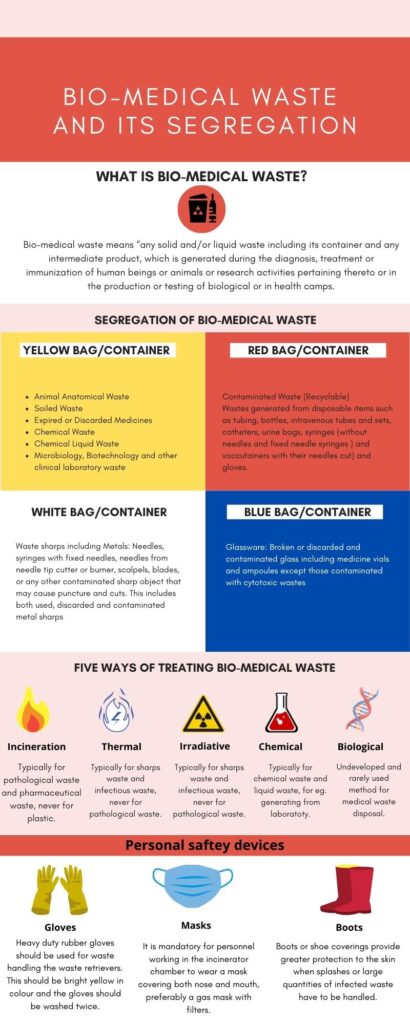Home isolation patients complain that the MCD has not been collecting the waste regularly, while MCD workers have been using minimal protection on their rounds.
New Delhi: After all three members of Sandeep’s family tested positive for Covid-19, they did not know they would have to take care of the piling garbage at their home along with their health. When the Municipal Corporation of Delhi’s (MCD) van did not come separately to their house even after a couple of days, they had to call a private garbage collector to collect their bio-medical waste.
As the coronavirus cases increase in Delhi, the amount of bio-hazardous waste generated in the city also reached new highs. According to a news report, Covid-19 waste generated till July 2020 was around 7.2 tonnes per day. By April 2021, this increased to 12.5 to13 tonnes per day.
With this increase, comes the increase in the workload for the MCD, which is responsible for collecting and treating waste from Covid positive patients in the city. Many patients in home isolation complain that the MCD has not been collecting the waste regularly.
Harvinder Singh, another patient living in West Delhi, said, “For the past 14 days that my wife and I had Covid, the MCD van did not show up to collect the garbage. We kept on giving our waste to our local garbage collector.”
Vijay Yadav, the Public Health Inspector of Rohini MCD said that they have been collecting waste as per the list provided to them by the health department of the Delhi government.
“We get a district-wise list from the government. We divide that based on our zones and give it to the sanitation department who collect the waste. Since the number of Covid positive patients is huge, sometimes it takes us a couple of days to collect the waste,” he said.
Pravin, in charge of the Janakpuri South sanitation department, said that there are two ways in which they get to know if there is a Covid positive patient in a house. “First, we get a list from our Nodal officer and next, sometimes the Residential Welfare Association (RWA) also informs us,” he said.
Pravin complained that most people do not inform either them or the RWA’s of a Covid positive case in a house. “If the Nodal officer is not informed of the case and if we do not come to know, how will we segregate the waste separately?” he asked.
MCD workers at risk

“The MCD workers do not realize that a major portion of their waste is a Covid-19 waste,” Mohit Saini, Director at the Hara Jeevan foundation, said. He explained that the masks, gloves, and disinfectant wipes we use at homes too should be treated in the same way as bio-medical waste.
The Central Pollution Control Board (CPCB) guidelines state that “refuse from patients’ houses must be collected daily, in colour-coded and sealed bags, to prevent any spread of infection. Household biomedical waste has to be put in yellow bags.”
The MCD drivers have no colour-coded bags to offer to the Covid-stricken households and most people seem to be unaware that they ought to be in colour-coded bags.
Ganga Kumar Das, a driver working with the MCD, is not aware of these bags. Neither is he aware that he should be wearing protective equipment while handling all kinds of waste during these times.
“We do not know which house has a positive case until our supervisor tells us. We only wear masks and gloves while handling the waste from Covid positive houses. Rest, we collect everything as normal,” he said.
He added, “In case there is a mask or PPE in the normal garbage, we segregate it when we take it at the dumpsite.”
Madhukar Varshney, one of the founding members of the Rise Foundation, affirmed that he has been getting complaint calls against the MCD from all over Delhi.
“Up until last year, the system of waste management in Delhi was organized. Back then, the houses had a Covid positive sticker as well to let the sanitation workers know of any infection in the waste. This time, we have seen and heard that the bio-medical waste is being mixed with the normal waste,” he said.
Varshney explained that the problem has two sides to it. Firstly, most people do not consider it worthwhile to inform the MCD as the seriousness of disposal of bio-medical waste does not dawn on them. Next, the MCD also is slacking in their work.
“The increased pressure cannot be an excuse. You had a previous experience to fall back on, you should have been better prepared this time,” he said.
Saini explained that the improper collection and disposal of bio-medical waste would cause a lot of problems to not just our health but also to the environment. The bio-medical waste, he explained, can spread the virus to people who handle it.
“Also, the waste is usually kept in the open and animals feed on it. There is a risk there. Next, the waste can also seep into the ground and contaminate the soil and the groundwater. If that happens, it would be a challenge to manage the contamination,” he said.




